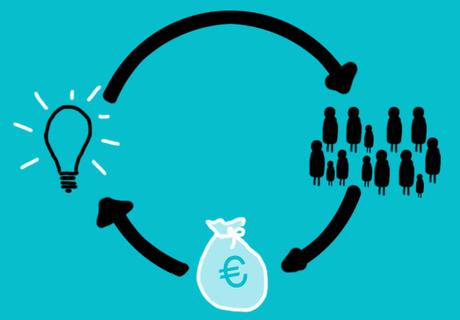
Beg, borrow, do whatever it takes, just don't steal-That's the advice I received from a mentor when I asked him "How do I raise funds for my ideas".
Now, this was at the start of my entrepreneurial journey. The mentor was a successful business owner. He was someone who had bootstrapped his startup to a million-dollar turnover in less than 3 years. I always held him in high regard for his work ethic and professional demeanor. His advice was always gold for me.
They raised most of the money through family, friends and acquaintances. These were the people who believed in his idea and backed him to make it happen.
Since he raised the money from so many people, the risk too got divided between them. Thereby, not putting a great deal of pressure on any one investor (in case the venture failed).
He advised me to stay away from VCs as they take away your freedom to run your business on your own terms. I paid heed to the advice given by the "wise man" and borrowed money from friends and family to start my venture.
All that I wrote above was 10 years back.

Today, Fundraising has transformed drastically. Enter Crowdfunding.
Back then, I would have laughed off anyone suggesting - I want to raise funds by pitching my idea to strangers on the internet. However, things have changed. Crowdfunding, a method to raise funds from 'Crowd' comprising multiple people (known/ unknown), has changed the way they do fundraising. It has been a boon for startup owners who do not want to raise funds through VCs and Angel Investors at the cost of diluting stake.
In the last few years, crowdfunding has gained quite a popularity for its innovative method of raising funds.
As per the latest statistics from Statistaca, Kickstarter the biggest crowdfunding websites in the world has received pledges worth 3.9 billion $ till October 2018. And Statistica says the Transaction Value is expected to show an annual growth rate (CAGR 2018-2022) of 28.8% resulting in the total amount of US$25,750.2m by 2022.
The beauty of the concept lies in the creative methods used by entrepreneurs to raise funds for their startups.
Famous Crowdfunding Platforms:
Most Crowdfunding these days takes place on web-based platforms referred to as crowdfunding websites. Some famous Crowdfunding websites are:
Crowdfunding operates through these crowdfunding websites. These websites offer an easy-to-use interface where startups wanting to raise funds set up their project. The project has all the information related to the concept, the plan of action, what they are offering to investors and other relevant information.
Once an investor is a part of the project, they can now view the progress of the project through an intuitive web-based interface. The Crowdfunding website takes a commission % for every project that meets its fundraising target.
Why Crowdfunding works?
In recent years, Crowdfunding has carved out a niche for itself in the fundraising methods. It has not only allowed startup owners but creative people from virtually any area to find backers to fund their project.
Crowdfunding Works because:
Crowdfunding is a process where you do not raise funds from a single investor but multiple investors. The amount invested by them depends on the minimum amount limit set by Project Creators. The investors can invest any amount more than the minimum amount-helping the business get funded by many people. The unique approach to fundraising allows the risk to get divided among all the investors.
Tomorrow, if things do not go as planned, the risk division ensures the money lost is not as high for any one person as it would have been if few people had funded the project. The hedging model makes Crowdfunding a less risky method of raising funds.
The Transparent process:
From the day you post your campaign to the day you get funded, everything is transparent.
As an investor, you have all the options to assess the project in terms of:
- Background of founder
- The idea of project
- Revenue model
- The execution strategy
- And other relevant parameters such as project milestones, how money raised will be utilized.
The transparency helps create better trust between investors and project owners. Investors have a clarity on what they are getting into. As soon as the investor comes onboard, they can follow the progress of project through the online system and can post comments, and feedback on the progress.
They become a part of the journey of entrepreneurs where they can at any time send feedback to the entrepreneur and the crowdfunding website.
Crowdfunding allows you to better present your idea:
I suppose that typical elevator pitches are between 30 seconds to 2 minutes. I do not suppose the presentations you make in startup events run for over 15 to 30 minutes. Correct me if my assumptions are incorrect.
The pitches and presentations work perfectly fine for entrepreneurs who are good at speaking and are precise with their presentation. But what if you are an entrepreneur who is not good at giving presentations? What if your idea is complex and you need over 15 minutes to explain it to others?
Some would say "If they cannot explain it in 15 minutes, it is not worth investment". I differ from them. We all have our strengths and weakness. Someone's inability to explain the concept in 15 minutes does not make the idea bad.
This is where crowdfunding helps.
Since everything is not live, you can prepare content for your project as per your convenience and if it is not up to mark, you can hire professional help to prepare your campaign and present it the way you want it. Your stage fear or inability to explain the idea to anyone in the shortest time will not be an impediment to raise funds. You get to tell the story your way without worrying about the elevator pitch and presentations.
Crowdfunding gives you access to a Variety of Investors:
With crowdfunding, you are not dealing with hard-nosed VCs who are looking for a big exit in the next 2-3 years. Instead, Crowdfunding will give you a wide exposure to investors from different ways of life. There will be people with the artistic mind frame. There will be people from marketing, financial and other backgrounds. All of them will be with you because of their belief in your project and they may all have something valuable to share with you.
I understand, too much noise can create confusion.
Yet, there is no harm in listening to the experience of others and picking the best of advice from investors.
Free Pre-sales promotion:
The biggest benefit of having so many investors is the free marketing and pre-sales promotion you will get for the venture. Since the investors have invested their money in your venture, you can expect them to promote the project. Their success is closely linked to your success.
The good word passed by them will help you generate buzz on social media and inner circles of investors before the launch of your startup.
Pre-orders and Partnerships:
There are serious investors on Crowdfunding platforms. Investors who have played a major role in fulling the growth of crowdfunding platforms. These investors will be closely watching your progress and if you are on the right track, they might offer to play a bigger role in your success.
They can help you forge partnerships with other companies or come on-board to your company's board as a bigger investor.
And that is not the end of the road for your partnership with them. Some of them will be eagerly awaiting your product's launch and will pre-order from you on the platform.

Types of Crowdfunding:
The benefits investors get from the crowd-funded venture is not always a stake in the startup. In fact, most campaigns have no stake involved in them for investors. Instead of stakes, the campaigns offer investors rewards.
Crowdfunding, then, is divided into two types:
Reward-based Crowdfunding:
In reward-based crowdfunding, the investor gets a reward for the money they invest.
The reward is in the form of:
- Early access to the product/services
- Free t-shirts
- Coffee with the startup founders
or anything that comes under the category of "rewards" not equity. Investors can invest very small amounts in reward-based crowdfunding.
Equity-based Crowdfunding:
Equity-based crowdfunding is where you own a % of a startup based on the investment made by you. The investment required in equity-based crowdfunding is a higher amount. Instead of the amount invested, the investor gets an equity percentage in the startup.
The equity-based crowdfunding projects are serious projects with a clear-cut revenue model. They are started by entrepreneurs who intend to raise more funds.
Crowdfunding Success
Crowdfunding has helped thousands of people raise funds for non-profit, profit, creative projects. In recent years, crowdfunding has gained popularity for its innovative approach. The biggest advantage of Crowdfunding is the ecosystem. The system is driven by "Crowd". The Crowd combines to help startups not only raise funds but get them additional value in the form of advice, feedback and much more.
Authored by Jasmeet Singh

J asmeet is an entrepreneur, Avid Reader, Startup Consultant, and a Reluctant Blogger at Lessons At Startup. A regular family guy and a proud father of Two adorable Kids 😊

Ms. Career Girl was started in 2008 to help ambitious young professional women figure out who they are, what they want and how to get it.

